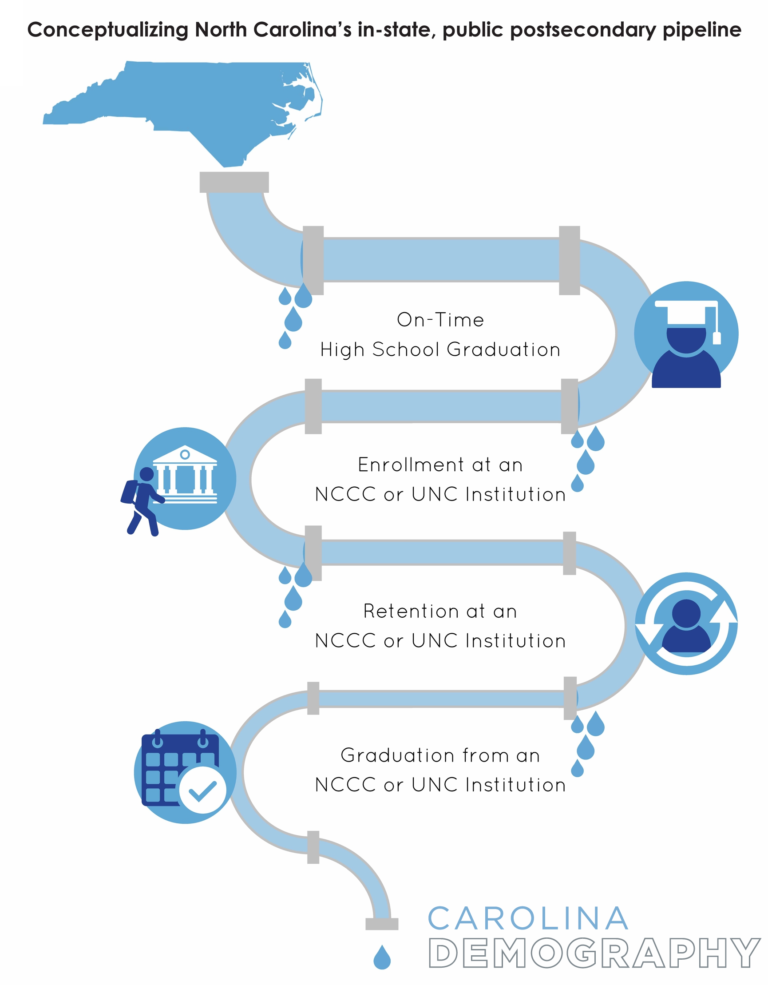Carolina Demography Releases Info about North Carolina’s Leaky Education Pipeline, T.E.A.C.H. NC Can Help to Seal the Gaps
Carolina Demography at the Carolina Population Center at UNC-Chapel Hill has been slowly trickling information about North Carolina’s Leaky Education Pipeline since last month. Robert Kinlaw at EdNC writes, “Most people in North Carolina don’t have any education beyond high school. That’s a big problem for the state’s workforce. If we think about the path to higher education as a pipeline, we can find the ‘leaks’ where students often fall out of their journey to a degree or credential.”
“The fastest-growing sectors of North Carolina’s economy demand employees with increasingly higher levels of educational attainment. By 2020, an estimated 67% of all jobs in North Carolina will require some education and training beyond high school. Today, 47% of North Carolina’s 5.3 million working-age adults (25-64 years old) have a postsecondary degree or nondegree credential,” writes Rebecca Tippett, Director of the Carolina Demography, and Jessica Stanford, Demographic Analyst of the Carolina Demography.
“Educational attainment is part of a decades-long process. It is the sum of educational experiences and exposures that begin at birth and continue well into adulthood. Overall pipeline completion—measured here as the timely completion of a postsecondary degree—is the cumulative result of success across multiple transition points in K-12 and postsecondary. Each transition point offers an opportunity for intervention to improve educational outcomes for individuals and North Carolina as a whole” (North Carolina’s Education Pipeline).
Tippett and Stanford suggest “Students currently in the state’s K-12 system represent the largest potential opportunity for North Carolina to move towards 60%” by 2030. However, let us not forget the largest potential opportunity for North Carolina is also in its youngest children—birth-5 years old—and those in the early childhood care and education workforce.
Potential in North Carolina’s Birth-5 Years Old

In many important ways, our preschool years determine our future competitive role in the global economy, the public safety of our communities, the cost-effective investment of public and private dollars and the success of welfare reform. Current research has shown that the early years (ages birth-5) are the most sensitive for brain development. More than 90% of brain growth occurs during this period. The people who help care for a child are also those who help shape a child’s mind. Studies show that children who receive quality child care enter school with better math, language and social skills. These skills give children a good start to succeed in school and in life.
To ensure North Carolina’s youngest children have access to affordable, high-quality child care, we must also focus on the teachers and providers who care for and educate birth-5 year olds. For many educators, barriers such as low wages, having children of their own, working full time and/or being a person of color stand in the way of furthering their education. “If we are to meet the demands of tomorrow’s job market, all North Carolinians must be able to realize the promise of education, particularly nontraditional students, minority and low-income students, rural students, and others who are disproportionately affected by challenges associated with postsecondary access and completion” (Tippett and Stanford).
Potential in North Carolina’s Early Childhood Workforce
 The Teacher Education and Compensation Helps (T.E.A.C.H.) Early Childhood® North Carolina Scholarship program takes on the issues facing many early childhood educators—under-education, low compensation and high turnover rates—by offering professional development opportunities for early childhood educators in North Carolina. As they complete coursework along a degree pathway, participants increase their marketability in the early childhood education system and experience incremental growth in their wages as well.
The Teacher Education and Compensation Helps (T.E.A.C.H.) Early Childhood® North Carolina Scholarship program takes on the issues facing many early childhood educators—under-education, low compensation and high turnover rates—by offering professional development opportunities for early childhood educators in North Carolina. As they complete coursework along a degree pathway, participants increase their marketability in the early childhood education system and experience incremental growth in their wages as well.
Nearly 49% of teachers working toward a bachelor’s degree through T.E.A.C.H. NC said they were not considering furthering their education before they heard about T.E.A.C.H. In fiscal year 2018, T.E.A.C.H. scholarship recipients were enrolled in 55 of North Carolina’s 58 community colleges, as well as in 12 state-supported universities and four private colleges. T.E.A.C.H. NC scholarships give them significant financial support and an experienced counselor to help them navigate the obstacles they may face in their personal life, career or in the higher education system.
“A highly trained workforce is a key driver of economic growth. Employers are drawn to regions where they can easily hire and retain skilled employees, and communities benefit substantially when new industries move to town or existing companies grow. More-educated workers are less likely to be unemployed and more likely to earn higher family-supporting wages. In addition, increased educational attainment is a powerful predictor of adult well-being, including better physical and mental health outcomes, more stable relationships, and greater civic knowledge and engagement. Adults’ educational attainment is also a key predictor of their children’s own level of education and wages” (Tippett and Stanford).
T.E.A.C.H. scholarship recipients represent the ethnic diversity of the children in North Carolina. Compared to 47% of the early care and education workforce statewide, nearly 50% of T.E.A.C.H. scholarship recipients are people of color. Recognizing the diverse educational backgrounds of the early childhood workforce, T.E.A.C.H. NC offers scholarship programs ranging from those appropriate for early childhood educators with no formal education beyond high school to scholarships that help degreed teachers earn their Birth-Kindergarten License or an Early Childhood Leadership Master’s Degree.
Since 2011, just over 37% of T.E.A.C.H. NC Associate Degree recipients are first generation students, meaning they do not have a parent or sibling who has attended college. Of those first generation students 58.5% came to T.E.A.C.H. with only a HS diploma/GED and 75.5% indicated their educational goal was to complete a degree. Since 2011, 33.3% of Bachelor Degree recipients are first generation students and of those first generation students, 93% indicated their educational goal was to complete a Bachelor or higher degree. From 2016-2018, 43% of associate in applied science degrees (specifically in early childhood education) and 66% of bachelor of arts degrees of T.E.A.C.H. NC recipients were first generation students.
In fiscal year 2018, 2,106 people participated in T.E.A.C.H. NC, with 141 associates degree graduates (up from 77 in fiscal year 2017), 32 bachelor’s degree graduates (up from 25 in fiscal year 2017) and 17 master’s in education degree graduates. Those educators completed nearly 13,000 credit hours at 71 higher education institutions, and ultimately, the end goal—improving the education and care they give children—was served for more than 57,543 children in North Carolina.
Just as Tippett and Stanford said, “Rather than rely on attracting highly educated individuals from other states and countries to increase our state’s attainment, we can strengthen our ability to cultivate our own talent,” and T.E.A.C.H. NC helps to cultivate talent among North Carolinians from birth-5 and in the early childhood education workforce.
About T.E.A.C.H. NC:
The T.E.A.C.H. Early Childhood® North Carolina Scholarship Program is an umbrella for a variety of different scholarship programs for those working in the early education field in North Carolina. Based on the partnership principle that requires support from the employing sponsoring program, T.E.A.C.H. scholarships are configured with five essential components: scholarship, education, compensation, commitment and counseling support. The T.E.A.C.H. Early Childhood® North Carolina Scholarship program is offered statewide and partners with the state’s higher education system to provide educational scholarship opportunities for early educators including those teaching in NCPK classrooms and infant toddler educators caring for children ages 0-2 in licensed facilities. Additionally, unique scholarship programs are available for system specialists within the early care and education system. Typically, comprehensive, core scholarships provide significant financial support for the following costs: in-state tuition, books, travel and if applicable, release time. Most importantly, all comprehensive scholarships mandate an award incentive for participants who successfully complete an annually specified number of semester credits. The T.E.A.C.H. Early Childhood® North Carolina Scholarship program is administered by Child Care Services Association. For more information, visit www.childcareservices.org/teach-nc.
About Child Care Services Association:
Founded in 1974, Child Care Services Association’s mission is to ensure affordable, accessible, high-quality child care for all young children and their families. Using a holistic approach, Child Care Services Association (CCSA) supports children and families, helps child care professionals improve the quality of early education children receive and ensures that all families can afford and access the high-quality early care and education that is so important for a child’s early development. Through its Meal Services Program, CCSA also provides nutritious meals to children at child care centers, where they may eat 50-100 percent of their meals. Our T.E.A.C.H. Early Childhood®, Child Care WAGE$® and Infant-Toddler Educator AWARD$® Plus programs give child care professionals the means to obtain an education and supplement their salary based on that education. CCSA also licenses T.E.A.C.H. and WAGE$ across the U.S. and conducts early childhood systems research and policy development statewide and nationally. For more information, visit www.childcareservices.org.
-end-



